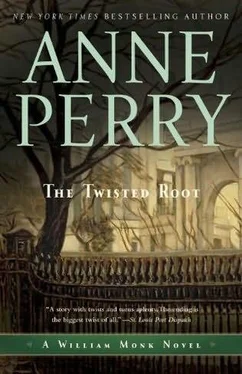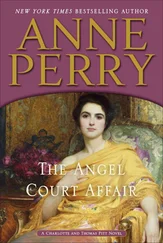Anne Perry - The Twisted Root
Здесь есть возможность читать онлайн «Anne Perry - The Twisted Root» весь текст электронной книги совершенно бесплатно (целиком полную версию без сокращений). В некоторых случаях можно слушать аудио, скачать через торрент в формате fb2 и присутствует краткое содержание. Жанр: Исторический детектив, на английском языке. Описание произведения, (предисловие) а так же отзывы посетителей доступны на портале библиотеки ЛибКат.
- Название:The Twisted Root
- Автор:
- Жанр:
- Год:неизвестен
- ISBN:нет данных
- Рейтинг книги:5 / 5. Голосов: 1
-
Избранное:Добавить в избранное
- Отзывы:
-
Ваша оценка:
- 100
- 1
- 2
- 3
- 4
- 5
The Twisted Root: краткое содержание, описание и аннотация
Предлагаем к чтению аннотацию, описание, краткое содержание или предисловие (зависит от того, что написал сам автор книги «The Twisted Root»). Если вы не нашли необходимую информацию о книге — напишите в комментариях, мы постараемся отыскать её.
The Twisted Root — читать онлайн бесплатно полную книгу (весь текст) целиком
Ниже представлен текст книги, разбитый по страницам. Система сохранения места последней прочитанной страницы, позволяет с удобством читать онлайн бесплатно книгу «The Twisted Root», без необходимости каждый раз заново искать на чём Вы остановились. Поставьте закладку, и сможете в любой момент перейти на страницу, на которой закончили чтение.
Интервал:
Закладка:
Step by step, Tobias took him through Miriam’s visits to Cleveland Square, her demeanor on each of them, her charm and her eagerness to learn. It was obvious to all that Harry Stourbridge had liked her without shadow of equivocation. He was shattered by her betrayal, not only for his son but for himself. He seemed still unable to grasp it.
Throughout Harry Stourbridge’s evidence, Rathbone glanced every now and again up at the dock, and saw the pain in Miriam’s face. She was a person enduring torture from which there was no escape. She had to sit still and abide it in silence.
Never once did he catch a member of the jury looking at either Miriam or Cleo. They were completely absorbed in Stourbridge’s ordeal. As he studied them he saw in each both pity and respect. Once or twice there was even a sense of identification, as if they could put themselves in his place and would have acted as he had, felt as he had. Rathbone wondered in passing if any of them were widowers themselves, or had sons who had fallen in love or married less than fortunately. He could not choose jurors. They had to be householders of a certain wealth and standing, and of course men. It had never been possible he could have had people who would identify with Miriam or Cleo. So much for a jury of one’s peers.
In the afternoon, Tobias quietly and with dignity declined to call Lucius Stourbridge to the stand. It was an ordeal he did not need to inflict upon a young man already wounded almost beyond bearing.
The jury nodded in respect. They would not have forgiven it of him if he had. Rathbone would have done the same, and for the same reasons.
Tobias called the last witness, Aiden Campbell. His evidence was given quietly, with restraint and candor.
"Yes, she had great charm," he said sadly. "I believe everyone in the household liked her."
"Including your sister, Mrs. Stourbridge?"
The question remained unanswered.
Campbell looked very pale. His skin was bleached of color, and there were shadows like bruises under his eyes. He stood straight in the witness stand, but he was shaking very slightly, and every now and again he had to stop and clear his throat. It was apparent to everyone in the courtroom that he was a man laboring under profound emotion and close to losing control of himself.
Tobias apologized again and again for obliging him to relive experiences which had to be deeply distressing for him.
"I understand," Campbell said, biting his lip. "Justice requires that we follow this to its bitter end. I trust you will do it as speedily as you may."
"Of course," Tobias agreed. "May we proceed to the days immediately leading to your sister’s death?"
Campbell told them in as few words as possible, without raising his voice, of Miriam’s last visit to Cleveland Square after her release from custody and from the charge of having murdered Treadwell. According to him, she was in a state of shock so deep she hardly came out of her room, and when she did she seemed almost to be in a trance. She was civil, but no more. She avoided Lucius as much as possible, not even allowing him to comfort her over her fearful distress on Cleo Anderson’s account.
"She was devoted to Mrs. Anderson?" Tobias stressed.
"Yes." There was no expression in Campbell’s face except sadness. "It is natural enough. Mrs. Anderson had apparently raised her as a daughter since she was twelve or thirteen. She would be an ungrateful creature not to have been. We respected it in her."
"Of course," Tobias agreed, nodding. "Please continue."
Reluctantly, Campbell did so, describing the dinner that evening, the conversation over the table about Egypt, their returning and each going about their separate pursuits.
"And Mrs. Gardiner did not dine with you?"
"No."
"Tell us, Mr. Campbell, did your sister say anything to you, that evening or earlier, about her feelings regarding the murder of Treadwell and the accusation against Mrs. Gardiner?"
Rathbone rose to object, but he had no legal grounds- indeed, no moral grounds either. He was obliged to sit down again in silence.
Campbell shook his head. "If you are asking if I know what happened, or why, no, I do not. Verona was distressed about something. She was certainly not herself. Any of the servants will testify to that."
Indeed, they already had, although, of course, Campbell had not been in court at the time, since he had not yet appeared himself.
"I believe she had discovered something …" His voice grew thick, emotion all but choking him. "It is my personal belief, although I know nothing to support it, that before she died, she knew who had killed Treadwell, and exactly why. I think that is why she returned alone to her room, in order to consider what she should do about it." He closed his eyes. "It was a fatal decision. I wish to God she had not made it."
He had said very little really. He had brought out no new facts, and he had certainly not accused anyone, and yet his testimony was damning. Rathbone could see it in the jurors’ faces.
There was no purpose in Rathbone’s questioning Campbell. There was nothing for him to say, nothing to elaborate, nothing to challenge. It was Friday evening. He had two days in which to create some kind of defense, and nothing whatever with which to do it-unless Monk found something. And there was no word from him.
When the court rose he considered pleading with Miriam one more time, and abandoned the idea. It would serve no purpose. Whatever the truth was, she had already convinced him that she would go to the gallows rather than tell it.
Instead, he went out into the September afternoon and took a hansom straight to Primrose Hill. He did not expect his father to offer any answers; he went simply for the peace of the quiet garden in which to ease the wounds of a disastrous week, and to prepare his strength for the week to come, which promised to be even worse.
11
While Rathbone was sitting helplessly in the courtroom, Monk began his further investigations into the details of Treadwell’s life. He had already asked exhaustively at the Stourbridges’ house and generally in the area around Cleveland Square. No one had told him anything remotely helpful. Treadwell had been tediously ordinary.
He began instead in Kentish Town, where Treadwell had grown up. It was a long task, and he held little hope of its proving successful. In time he began to fear that Miriam Gardiner was guilty as charged and that poor Cleo Anderson had been drawn into it because of her love for the girl she had rescued. She had refused to recognize that beneath the charm and apparent vulnerability, Miriam had grown into a greedy and conniving woman who would not stop even at murder in order to get what she wanted. Love could be very blind. No mother wanted to see evil in her child, and the fact that Cleo had not borne Miriam would make no difference to her.
His earlier pity for Miriam hardened to anger when he thought of the grief it would bring to Cleo when she was faced with facts she could no longer deny to herself. Miriam may not have asked to be loved, or to be believed in, but she had accepted it. It carried a moral responsibility, and she had failed it as badly as anyone could. The deception was worse than the violence.
He walked the streets of Kentish Town, going from one public house to another asking questions as discreetly as the desperately short time allowed. Twice he was too open, too hasty, and earned a sharp rebuff. He left and began again farther along, more carefully.
By sundown he was exhausted, his feet hurt merely to the touch. He took an omnibus home. Monk would earn no further money in this case, but he simply cared passionately to learn the truth. Lucius Stourbridge would have continued to pay him; indeed, he had still implored Monk to help only a week earlier. But Monk had refused to take anything further from him for something he was all but certain he could not accomplish. The young man had lost so much already; to have given him hope he could not justify would be a cruelty for which he would despise himself.
Читать дальшеИнтервал:
Закладка:
Похожие книги на «The Twisted Root»
Представляем Вашему вниманию похожие книги на «The Twisted Root» списком для выбора. Мы отобрали схожую по названию и смыслу литературу в надежде предоставить читателям больше вариантов отыскать новые, интересные, ещё непрочитанные произведения.
Обсуждение, отзывы о книге «The Twisted Root» и просто собственные мнения читателей. Оставьте ваши комментарии, напишите, что Вы думаете о произведении, его смысле или главных героях. Укажите что конкретно понравилось, а что нет, и почему Вы так считаете.












